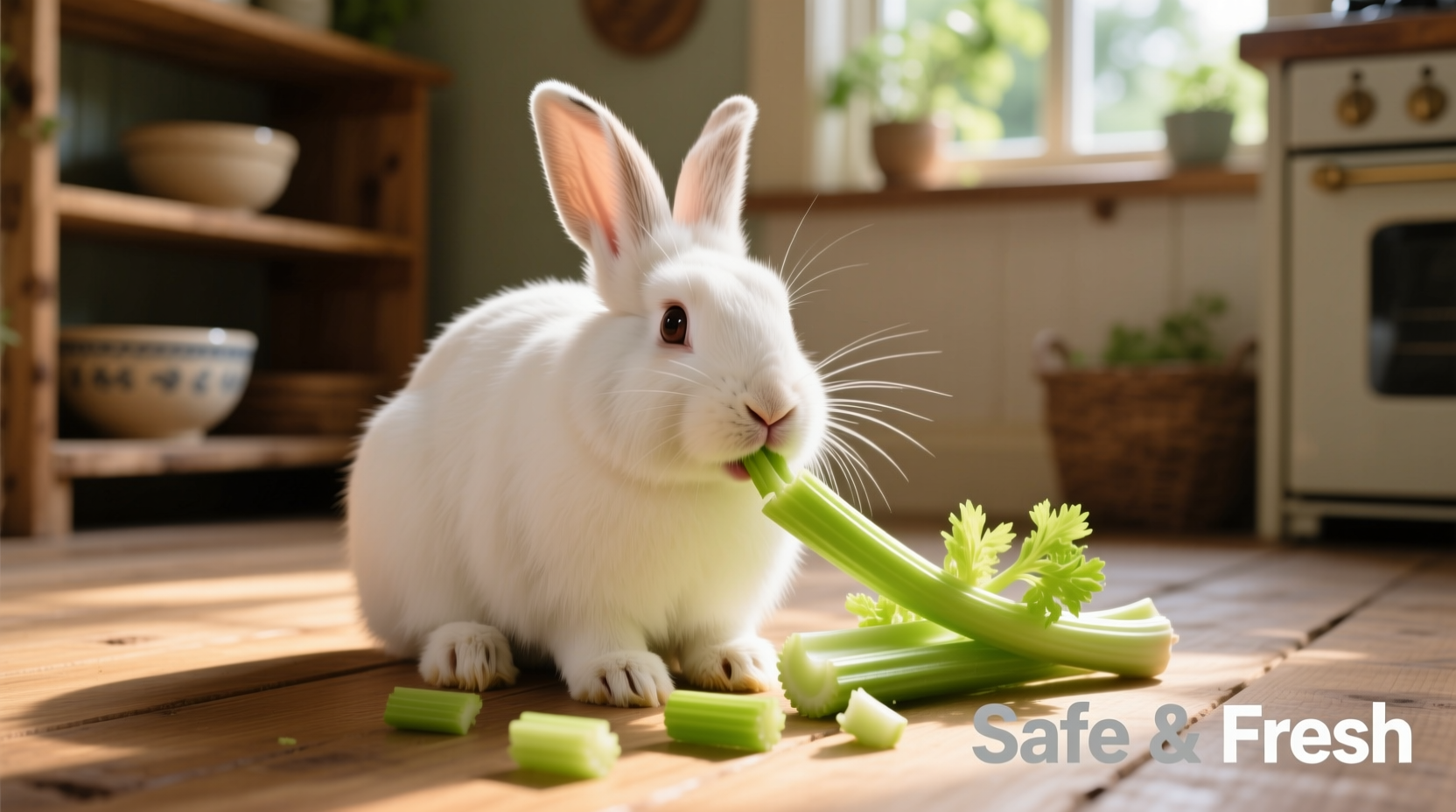Yes, bunnies can safely eat celery in moderation, but with important precautions. The stringy parts pose choking and digestive blockage risks, while excessive consumption can cause gas and diarrhea. Limit to 1-2 inches of chopped celery per 5 lbs body weight, 2-3 times weekly, with strings removed. Celery leaves are actually more nutritious than stalks and can be offered more freely.
Why Rabbit Digestion Matters for Celery Safety
Rabbit digestive systems require high-fiber, low-sugar diets to function properly. Unlike humans, rabbits have a delicate cecum where fiber fermentation occurs. Sudden dietary changes or inappropriate foods can disrupt this balance, leading to potentially fatal gastrointestinal stasis.
According to the House Rabbit Society, a leading rabbit welfare organization, "Rabbits need a constant supply of grass hay as the foundation of their diet, with limited fresh vegetables as supplements." Celery fits into this supplemental category but requires careful preparation.
Celery Nutrition Profile: Benefits and Risks
Celery offers hydration and some nutrients beneficial for rabbits, but it's not without risks. Let's examine the nutritional facts:
| Nutrient | Per 100g Celery | Benefit for Rabbits | Concern |
|---|---|---|---|
| Water | 95.4g | Hydration support | Excess causes soft stool |
| Fiber | 1.6g | Digestive health | Lower than ideal for rabbits |
| Vitamin K | 29.6μg | Blood clotting support | Generally beneficial |
| Potassium | 260mg | Electrolyte balance | Excess strains kidneys |
While celery provides hydration and some nutrients, its high water content (95.4%) means it should never replace hay as the primary fiber source. The American Veterinary Medical Association notes that "excessive moisture in vegetables can disrupt normal cecal function" in rabbits.
Safe Celery Preparation: Step-by-Step Guide
Follow these steps to safely prepare celery for your rabbit:
- Thoroughly wash celery to remove pesticides and dirt
- Remove all strings by peeling or cutting lengthwise (these cause intestinal blockages)
- Chop into small pieces (½ inch max) to prevent choking
- Start with tiny portions (1 inch for small rabbits) to monitor reaction
- Introduce gradually over 2-3 weeks if no digestive upset occurs
Interestingly, celery leaves contain higher concentrations of vitamins A, C, and calcium than the stalks. The Merck Veterinary Manual recommends prioritizing leafy greens over stalks for optimal nutrition.

How Much Celery Is Too Much? Portion Guidelines
Overfeeding celery causes more problems than underfeeding. Follow these portion guidelines based on your rabbit's weight:
- Small rabbits (2-4 lbs): ½-1 inch of chopped celery, 2x weekly
- Medium rabbits (5-8 lbs): 1-2 inches of chopped celery, 2-3x weekly
- Large rabbits (9+ lbs): 2-3 inches of chopped celery, 3x weekly
Remember that celery should comprise no more than 10% of your rabbit's fresh vegetable intake. The remaining 90% should come from lower-risk vegetables like romaine lettuce, cilantro, and parsley.
When to Avoid Celery Completely
Certain situations require complete avoidance of celery:
- Baby rabbits under 12 weeks: Their digestive systems can't handle vegetables yet
- Rabbits with existing GI issues: Including soft stool or reduced appetite
- During antibiotic treatment: Gut flora is already compromised
- Overweight rabbits: Prioritize lower-calorie vegetables
The House Rabbit Society Journal emphasizes that "any dietary change for a rabbit showing signs of digestive distress should be made only under veterinary supervision."
Better Vegetable Alternatives to Celery
While celery is acceptable in moderation, these vegetables provide better nutritional value with fewer risks:
- Leafy greens: Romaine lettuce, red leaf lettuce, cilantro, parsley
- Herbs: Basil, dill, mint (excellent for digestion)
- Cruciferous vegetables: Broccoli leaves (not stems), cauliflower leaves
- Root tops: Carrot tops, beet greens (more nutritious than roots)
Rotate 5-6 different vegetables daily to ensure nutritional variety. Always introduce new foods one at a time over 14 days to monitor for adverse reactions.
Signs Your Rabbit Reacted Poorly to Celery
Watch for these warning signs after feeding celery:
- Reduced or absent fecal pellets
- Soft or absent cecotropes (night feces)
- Decreased appetite lasting more than 4 hours
- Visible straining or hunched posture
- Excessive teeth grinding (indicates pain)
If you notice these symptoms, remove all vegetables immediately and contact your exotic veterinarian. Gastrointestinal issues can become life-threatening within 24 hours for rabbits.











 浙公网安备
33010002000092号
浙公网安备
33010002000092号 浙B2-20120091-4
浙B2-20120091-4